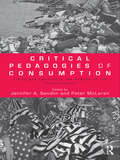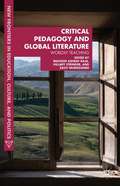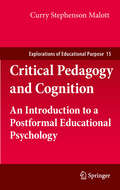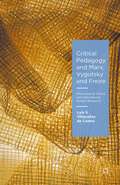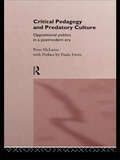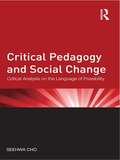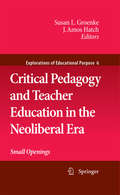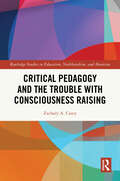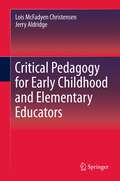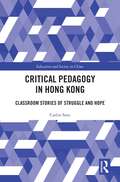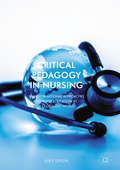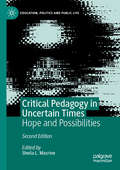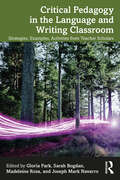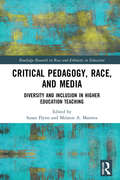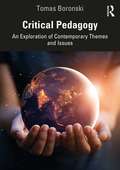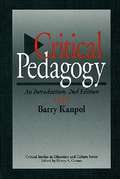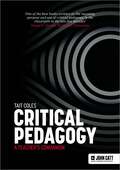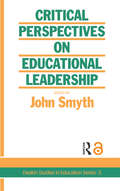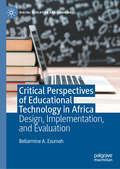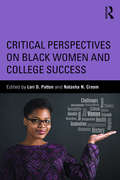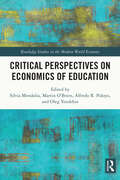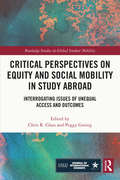- Table View
- List View
Critical Pedagogies of Consumption: Living and Learning in the Shadow of the "Shopocalypse" (Sociocultural, Political, and Historical Studies in Education)
by Jennifer A. Sandlin Peter McLaren"Utopian in theme and implication, this book shows how the practices of critical, interpretive inquiry can help change the world in positive ways…. This is the promise, the hope, and the agenda that is offered."--Norman K. Denzin, From the Foreword "Its focus on learning, education and pedagogy gives this book a particular relevance and significance in contemporary cultural studies. Its impressive authors, thoughtful structuring, wide range of perspectives, attention to matters of educational policy and practice, and suggestions for transformative pedagogy all provide for a compelling and significant volume."--H. Svi Shapiro, University of North Carolina–Greensboro Distinguished international scholars from a wide range of disciplines (including curriculum studies, foundations of education, adult education, higher education, and consumer education) come together in this book to explore consumption and its relation to learning, identity development, and education. Readers will learn about a variety of ways in which learning and education intersect with consumption. This volume is unique within the literature of education in its examination of educational sites – both formal and informal – where learners and teachers are resisting consumerism and enacting a critical pedagogy of consumption.
Critical Pedagogy And Global Literature
by Masood Ashraf Raja Hillary Stringer Zach VandezandeIn one volume, this edited collection provides both a theoretical and praxis-driven engagement with teaching world literature, focusing on various aspects of critical pedagogy. Included are nine praxis-driven essays by instructors who have taught world literature courses at the university level.
Critical Pedagogy and Cognition: An Introduction to a Postformal Educational Psychology (Explorations of Educational Purpose #15)
by Curry Stephenson MalottThis book simultaneously contributes to the fields of critical pedagogy and educational psychology in new and innovative ways by demonstrating how critical pedagogy, postformal psychology, and Enlightenment science, seemingly separate and distinct disciplines, are actually part of the same larger, contextualized, complex whole from the inner most developmentally-fixed biological context of human faculties to the perpetually shifting, socially and politically constructed context of individual schema and human civilization. The text's uniqueness stems from its bold attempt to connect the postformal critical constructivist/pedagogy work of Joe Kincheloe and others to Western science through a shared, although previously misunderstood, critique and rejection of crude forms of social control, which the psychologists call behaviorism and Western scientists identify as mechanical philosophy. This book therefore argues that critical pedagogy-- which includes, among others, anarchist, Marxist, feminist, Indigenous (globally conceived), Afro-Caribbean/American, and postmodern traditions--and critical/constructivist educational psychology have much to gain by engaging previously rejected work in critical solidarity, that is, without compromising one's values or democratic commitments. The goal of this book is therefore to contribute to this vision of developing a more transgressive and transformational educational psychology.
Critical Pedagogy and Marx, Vygotsky and Freire: Phenomenal Forms and Educational Action Research
by Luis S. Villacañas de CastroThis book explores Marx's theory of the phenomenal forms in relation to critical pedagogy and educational action research, arguing that phenomenal forms pose a pedagogical obstacle to any endeavour that seeks to expand an individual's awareness of the larger social whole.
Critical Pedagogy and Predatory Culture: Oppositional Politics in a Postmodern Era
by Peter McLarenThis book is a principled, accessible and highly stimulating discussion of a politics of resistance for today. Ranging widely over issues of identity, representation, culture and schooling, it will be required reading for students of radical pedagogy, sociology and political science.
Critical Pedagogy and Social Change: Critical Analysis on the Language of Possibility (Critical Social Thought)
by Seehwa ChoAt its core, the main goal of critical pedagogy is deceptively simple—to construct schools and education as agents of change. While noble and ambitious, it is not always realistic in a climate of increased commodification, privatization of schooling, and canned curriculum. By assuming rather than articulating its own possibilities, critical pedagogy literature itself is often its own worst enemy in its call for transformation. With such challenges from both within and without, is the idea of liberatory pedagogy for social change out of reach or can critical educators really achieve the rather high call for social change? What alternative visions of schooling does critical pedagogy truly offer against the mainstream pedagogy? In short, what are the political projects of critical pedagogy? This powerful and accessible text breaks with tradition by teasing out mere assumptions, and provides a concrete illustration and critique of today’s critical pedagogy. Veteran teacher educator Seehwa Cho begins the book with an engaging overview of the history of critical pedagogy and a clear, concise breakdown of key concepts and terms. Not content to hide behind rhetoric, Cho forces herself and the reader to question the most basic assumptions of critical pedagogy, such as what a vision of social change really means. After a thoughtful and pithy analysis of the politics, possibilities and agendas of mainstream critical pedagogy, Cho takes the provocative step of arguing that these dominant discourses are ultimately what stifle the possibility for true social change. Without focusing on micro-level approaches to alternatives, Cho concludes by laying out some basic principles and future directions for critical pedagogy. Both accessible and provocative, Critical Pedagogy and Social Change is a significant contribution to the debates over critical pedagogy and a fresh, much-needed examination of teaching and learning for social justice in the classroom and community beyond.
Critical Pedagogy and Teacher Education in the Neoliberal Era: Small Openings (Explorations of Educational Purpose #6)
by J. Amos Hatch Susan L. GroenkeThe chapters in this edited collection make it clear that critical teacher educators are aware of neoliberalism and its profound impact on public schools and university-based teacher preparation programs. They know the deleterious effects of macro-level, neoliberal forces on the local and particular teaching contexts where they are trying to do critical pedagogical work. The authors describe the havoc NCLB has wreaked, especially on minority and ELL students; the pressures university-based teacher preparation programs feel to align themselves with neoliberal agendas; and the frustration of knowing that critical work is not always valued, supported, or understood in academe. Yet all of the authors in this book persist, finding or creating "small openings" in their contexts that foster the critical reflection, intellectual engagement, and examination of alternative paradigms that help beginning teachers pursue deeper understandings about schooling in a democratic society. They describe these openings here.
Critical Pedagogy and the Trouble with Consciousness Raising (Routledge Studies in Education, Neoliberalism, and Marxism)
by Zachary A. CaseyCritical Pedagogy and the Trouble with Consciousness Raising incisively critiques the consciousness-raising project that has been so central to contemporary critical pedagogy.The book argues that consciousness-raising work in formal educational settings over the past three decades has largely failed to advance social justice. By critiquing consciousness raising as an end in itself, the author employs a Marxist framework to highlight how consciousness raising alone cannot alter material conditions and realities. Consequently, the book illustrates how many pedagogical projects fail to transcend the idealist realm and impact the material world. Advocating for a materialist critical pedagogy that revisits Freirean principles of praxis and dialogue, the author proceeds to outline a politics of redistribution to invigorate future critical educational projects. From examining how discourse functions ideologically to uphold the status quo, to exploring how determinisms limit our life chances and imaginations, the author demonstrates that the challenges in achieving socially just education are largely self-imposed. The book concludes with a new approach to critical pedagogy that avoids reifying consciousness raising and reasserts the importance of praxis in all critical educational endeavors. It will appeal to scholars and researchers interested in critical pedagogy, the sociology of education, critical theory, and the philosophy of education.
Critical Pedagogy for Early Childhood and Elementary Educators
by Lois Christensen Jerry AldridgeAmong the welter of books on critical pedagogy, this volume will be especially valued for its direct focus on early years and elementary educators. Benefiting from the considered views of two veteran teachers of critical pedagogy, the volume is far more than a knowledge-rich resource, offering as it does vital support in applying the tenets of critical pedagogy to classroom practice. Alongside specific examples of teachers engaging in critical pedagogy in elementary and early-childhood classrooms, the material features close analysis and guidance that will help ease teachers into reflective practice in critical pedagogy that is based on praxis--the point at which theory and practice meet and interact. Indeed, the authors move readers even further than this, showing how students as well as teachers can transform their experience of education through critical reflection. After surveying the field of critical pedagogy, the authors discuss the core precepts that inform the classroom practice of critical pedagogues. They move on to discuss how vital these early and elementary years are in forging children's nascent identities. Other topics covered include discrimination, gender issues, the development of social justice projects, and the social transformations that critical pedagogy can manifest in the classroom. Finally, this resource explains how teachers can move forward in their classroom practice to enhance equity, justice and social responsibility. This book is essential reading for classroom practitioners in early and elementary education, whether neophytes or veterans, who are interested in deploying this powerful educational paradigm in their work. After surveying the field of critical pedagogy, the authors discuss the core precepts that inform the classroom practice of critical pedagogues. They move on to discuss how vital these early and elementary years are in forging children's nascent identities. Other topics covered include discrimination, gender issues, the development of social justice projects, and the social transformations that critical pedagogy can manifest in the classroom. Finally, this resource explains how teachers can move forward in their classroom practice to enhance equity, justice and social responsibility. This book is essential reading for classroom practitioners in early and elementary education, whether neophytes or veterans, who are interested in deploying this powerful educational paradigm in their work.
Critical Pedagogy in Hong Kong: Classroom Stories of Struggle and Hope (Education and Society in China)
by Carlos SotoThis book chronicles the author’s application of critical pedagogy in Hong Kong secondary schools serving students from working-class families of South Asian heritage, so-called ‘ethnic minorities’ in the local context. Soto used concepts such as banking pedagogy, generative themes, liberatory dialogue, and transformative resistance, to first understand students’ school, online, and community experiences, and then to reshape his teaching of English and humanities subjects to address the students’ academic, social, and emotional needs. This critical ethnography is set against educational reforms in Hong Kong, which re-orientated schools towards developing a knowledge-economy workforce, increased privatization and competition in the school system, aimed to build national identification with China, and sought to address growing inequality in a territory known for wealth disparity. While these reforms opened opportunities for implementing student-centered pedagogies in schools and increased student access to tertiary education, ethnic minority youth faced ongoing economic and social marginalization on top of academic difficulties. The central narrative captures everyday struggles and contradictions arising from intersections of neoliberal reforms, institutional school histories, students’ transnational realities, and collective efforts for equity and social justice. In the course of the book a parallel story unfolds, as the author explores what it means to be a critical teacher and researcher, and is reborn in the process. The book’s ‘on the ground’ story is hopeful, yet tempered, in discussing the limits and possibilities for critical pedagogy. It will be of a great resource for researchers, teacher educators, and pre-service and in-service teachers who are interested in the topic.
Critical Pedagogy in Nursing: Transformational Approaches to Nurse Education in a Globalized World
by Sue DysonThis book explores the academic processes of nursing education in times of uncertainty around healthcare policy and healthcare provision. Grounded in research examining current theory, policy and culture around nursing pedagogy, Sue Dyson addresses the core issues facing nurses today and argues that the current curriculum no longer reflects or serves contemporary nursing practice. In a time of scandals, cuts in funding and shortfalls in the profession, this book provides an answer to the growing call for a dynamic restructuring of nurse education. Offering a critical analysis of innovative pedagogies for nursing, the author proposes the notion of the co-created curriculum as a way forward for nurse education in the post-Francis era. This will be an invaluable read to academics, practitioners and policy makers in the fields of nursing, medicine, education, education policy and medical sociology.
Critical Pedagogy in Uncertain Times
by Sheila L. MacrineThis book brings together the most important figures in the evolution of Critical Pedagogy to provide comprehensive analyses of issues related to the struggle against the forces of neoliberalism and the imperial-induced privatization, not just in education, but in all of social life through the radical democratizing forces of critical pedagogy.
Critical Pedagogy in Uncertain Times: Hope And Possibilities (Education, Politics And Public Life Series)
by Sheila L. MacrineThis edited volume, now in its second edition, brings together the some of the most important figures in the evolution of Critical Pedagogy and a number of up-and-coming scholars. Together they provide comprehensive analyses related to the struggles against the triangulation of Neoliberalism, Conservatism, and Nationalism, not just in education but in all of social life, through the democratizing forces of critical pedagogy. Its re-release coincides with the 50th anniversary of the publication of Paulo Freire’s landmark publication, Pedagogy of the Oppressed. The second edition has been updated with a majority of new chapters to address the current political shifts that have hastened erosion of the public sphere and public education today. These critical pedagogues show how neoliberal attacks can be collectively resisted, challenged, and eradicated especially by those of us teaching in schools and universities.
Critical Pedagogy in Uncertain Times: Hope and Possibilities (Education, Politics and Public Life)
by Sheila L. MacrineThis edited volume, now in its second edition, brings together the some of the most important figures in the evolution of Critical Pedagogy and a number of up-and-coming scholars. Together they provide comprehensive analyses related to the struggles against the triangulation of Neoliberalism, Conservatism, and Nationalism, not just in education but in all of social life, through the democratizing forces of critical pedagogy. Its re-release coincides with the 50th anniversary of the publication of Paulo Freire’s landmark publication, Pedagogy of the Oppressed. The second edition has been updated with a majority of new chapters to address the current political shifts that have hastened erosion of the public sphere and public education today. These critical pedagogues show how neoliberal attacks can be collectively resisted, challenged, and eradicated especially by those of us teaching in schools and universities.
Critical Pedagogy in the Language and Writing Classroom: Strategies, Examples, Activities from Teacher Scholars
by Gloria Park Sarah Bogdan Madeleine Rosa Joseph Mark NavarroThis volume introduces theory-to-practice-based critical pedagogy grounded in Paulo Freire’s scholarship to language and literacy learning settings. The chapters present authentic experiences of teacher-scholars, feature real-world examples and activities ready for implementation in the classroom, and provide nuanced guidance for future teachers. The examples and activities from teacher-scholars place critical pedagogy at the heart of classroom contexts and cover key topics, including place-based pedagogy, contemplative pedagogy, technology within the classroom, and translingual and multimodal paradigms. The chapters include further readings and discussion questions that challenge assumptions and promote deeper reflection, and can be modified for different teaching contexts. This practical volume is essential reading for students and scholars in TESOL and critical pedagogy.
Critical Pedagogy, Race, and Media: Diversity and Inclusion in Higher Education Teaching (Routledge Research in Race and Ethnicity in Education)
by Susan Flynn Melanie A. MarottaCritical Pedagogy, Race, and Media investigates how popular media offers the potential to radicalise what and how we teach for inclusivity. Bringing together established scholars in the areas of race and pedagogy, this collection offers a unique approach to critical pedagogy by analysing current and historical iterations of race onscreen. The book forms theoretical and methodological bridges between the disciplinary fields of pedagogy, equality studies, and screen studies to explore how we might engage in and critique screen culture for teaching about race. It employs Critical Race Theory and paradigmatic frameworks to address some of the social crises in Higher Education classrooms, forging new understandings of how notions of race are buttressed by popular media. The chapters draw on popular media as a tool to explore the social, economic, and cultural dimensions of racial injustice and are grouped by Black studies, migration studies, Indigenous studies, Latinx studies, and Asian studies. Each chapter addresses diversity and the necessity for teaching to include visual media which is reflective of a myriad of students’ experiences. Offering opportunities for using popular media to teach for inclusion in Higher Education, this critical and timely book will be highly relevant for academics, scholars, and students across interdisciplinary fields such as pedagogy, human geography, sociology, cultural studies, media studies, and equality studies.
Critical Pedagogy: An Exploration of Contemporary Themes and Issues
by Tomas BoronskiThis accessible text provides a clear overview of the contemporary themes and challenges within critical pedagogy, and suggests a path towards a more conscientious world for all through education. Boronski encourages us to imagine radical alternatives to current approaches, not merely for ideological reasons, but due to increasing necessity for environmental and sociological perspectives. With case studies, discussion tasks and exemplars from global history woven throughout, each chapter considers a prominent societal and educational issue, tackling some difficult and unsettling areas. Embedded in this exploration is an understanding and application of key concepts, such as justice, equality, rights and power, and how these relate to a range of topics in UK schooling. These include the role of teachers in an age of hyper surveillance and performance monitoring, alternative approaches to education, and the growing fear of the ‘other’. Essential reading for Education Studies students at undergraduate and Master’s level, this comprehensive text will also be of interest to students of Social Policy, Sociology and Politics programmes.
Critical Pedagogy: An Introduction (2nd Edition) (Critical Studies in Education and Culture Series)
by Barry KanpolCritical pedagogy refers to the means and methods of testing and attempting to change the structures of schools that allow inequities. It is a cultural-political tool that takes seriously the notion of human differences, particularly those related to race, class, and gender. Critical pedagogy seeks to release the oppressed and unite people in a shared language of critique, struggle, and hope, to end various forms of human suffering. In this revised edition, Kanpol takes the pre- and in-service educators along some initial steps to becoming critical pedagogists. As before, university professors and public school teachers alike will learn how to address their own prophetic commitments to belief and faith in the fight against despair, institutional chaos, oppression, death of spirit, and exile.
Critical Pedagogy: a teacher's companion
by Tait ColesCritical pedagogy is a transformative approach to education, moving beyond a simple transmission model of teaching where the teacher imparts predetermined knowledge to students. This participatory and empowering pedagogy can ensure classrooms become places of opportunity. Students are encouraged to critique their world and develop the essential attributes needed to become consciously aware, politically knowledgeable and socially responsible.Critical Pedagogy: a teacher's companion provides a refreshing perspective on English secondary education and discusses why critical pedagogy is more essential than ever for our marginalised and oppressed students. Realistic, pragmatic and sensitive suggestions enable the school leader and classroom teacher to consider critical pedagogy as an ongoing responsive, moral and political endeavour to fight social injustice. This book is a must-read for all those who value education as the practice of freedom and emancipation.
Critical Pedagogy: a teacher's companion
by Tait ColesCritical pedagogy is a transformative approach to education, moving beyond a simple transmission model of teaching where the teacher imparts predetermined knowledge to students. This participatory and empowering pedagogy can ensure classrooms become places of opportunity. Students are encouraged to critique their world and develop the essential attributes needed to become consciously aware, politically knowledgeable and socially responsible.Critical Pedagogy: a teacher's companion provides a refreshing perspective on English secondary education and discusses why critical pedagogy is more essential than ever for our marginalised and oppressed students. Realistic, pragmatic and sensitive suggestions enable the school leader and classroom teacher to consider critical pedagogy as an ongoing responsive, moral and political endeavour to fight social injustice. This book is a must-read for all those who value education as the practice of freedom and emancipation.
Critical Perspectives On Educational Leadership
by John SmythFirst Published in 1989. Routledge is an imprint of Taylor & Francis, an informa company.
Critical Perspectives of Educational Technology in Africa: Design, Implementation, and Evaluation (Digital Education and Learning)
by Bellarmine A. EzumahThis book is a critical-cultural evaluation of educational technology adoption in Sub-Saharan Africa, including projects such as the OLPC (One Laptop Per Child). It presents efficient ways of improving education delivery among low-income communities through designing and implementing congruent educational technologies that incorporate social and cultural proclivities. Ezumah defines technology with regards to pedagogy, and seeks to debunk the assumption that educational technology consists only of digital and interactive options. Additionally, she argues for a narrative paradigm shift aimed at validating analog technologies as equally capable of providing necessary and desired educational objectives and outcomes for communities who cannot afford the digital alternatives. By comparing African educational systems in precolonial, colonial, and post-colonial times and incorporating the history of technology transfers from the Global North to South, the book highlights cultural imperialism, development theory, neocolonialism, and hegemonic tendencies.
Critical Perspectives on Black Women and College Success
by Lori D. Patton Natasha N. CroomIn this comprehensive volume, research-based chapters examine the experiences that have shaped college life for Black undergraduate women, and invite readers to grapple with the current myths and definitions that are shaping the discourses surrounding them. Chapter authors ask valuable questions that are critical for advancing the participation and success of Black women in higher education settings and also provide actionable recommendations to enhance their educational success. Perspectives about Black undergraduate women from various facets of the higher education spectrum are included, sharing their experiences in academic and social settings, issues of identity, intersectionality, and the services and support systems that contribute to their success in college, and beyond. Presenting comprehensive, theoretically grounded, and thought-provoking scholarship, Critical Perspectives on Black Women and College Success is a definitive resource for scholarship and research on Black undergraduate women.
Critical Perspectives on Economics of Education (Routledge Studies in the Modern World Economy)
by Silvia Mendolia, Martin O’Brien, Alfredo R. Paloyo, and Oleg YerokhinThis book brings together leading scholars in the field to provide insights on economics of education. The book begins with an overview of education and human capacity development and looks at the production of education through individuals’ learning, education financing and the role of individual circumstances. It also analyses the complex relationship between education and mobility and highlights what key challenges for education systems in a global world are. Each chapter provides detailed analysis of interesting and policy relevant topics in the fields of education economics and human capacity development. This book is a useful reference for those who wish to understand the changing landscape and models of higher education in the context of digital advances and innovation. It will also be of interest to those in the areas of education and training.
Critical Perspectives on Equity and Social Mobility in Study Abroad: Interrogating Issues of Unequal Access and Outcomes (Routledge Studies in Global Student Mobility)
by Chris R. Glass Peggy GesingThis edited volume brings together the perspectives of a diverse group of international scholars to explore the intersections of study abroad and social mobility. In doing so, it challenges universalist assumptions and power imbalances implicit in study abroad across the Global North and South, and explores the implications of COVID-19 for equity within study abroad programs, policy, and practice going forward. Offering empirical, theoretical, and conceptual contributions, Critical Perspectives on Equity and Social Mobility in Study Abroad foregrounds critical reflection on the stratification of access to study abroad and examines the varied outcomes of international study in relation to graduates’ entry into domestic and international labor markets. Focusing on the experiences and outcomes of students from varied backgrounds, chapters identify a number of power imbalances relating to student race, ethnicity, religion, local and international policies and politics, and put forward valuable recommendations to ensure greater equity within the field. Against the backdrop of growing criticism over the power imbalances in international exchange, this text will benefit researchers, academics, and educators with an interest in higher education, international and comparative education, and multicultural education. Those interested in educational policy and the sociology of education more broadly will also benefit from this book.
